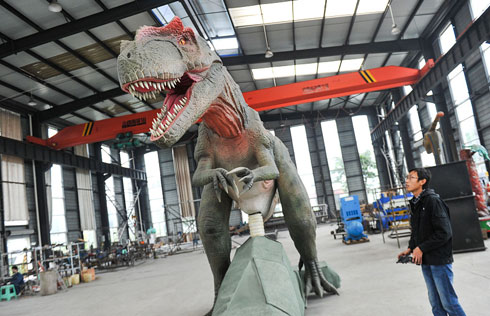High-tech stores to open their doors to online era
Self-service stores in China's major cities have become a growing trend as online technology extends opening hours.
The country's leading home-appliance retailer, Suning Commerce Group Co Ltd, recently rolled out its third self-service outlet - this time in Beijing.
There are now Suning Biu stores in Nanjing and Shanghai, selling more than 550 different products, including sportswear, groceries and high-tech gadgets.
Facial recognition technology allows consumers to enter and leave the stores, while goods are scanned and then paid for via its applications.
This self-service format is catching on and expanding from corner shops to restaurants and even to gyms.
Of course, the transformation taking place in convenience stores has reduced labor costs and brought in round-the-clock opening hours for customers.
Crucial to making this work is the sort of facial recognition technology developed by Xiao Maipu Technology Development Co Ltd, short for Xiaomai and Face++.
Aplus Capital and Chenshan Capital have invested 125 million yuan ($18.5 million) in the Beijing-based Xiaomai. The company plans to use the funding to build up its supply chain and upgrade its products and system.
"Staff-less stores can reduce the high costs that often keep traditional convenience stores from fast expansion and healthy revenue growth," said Quan Bin, deputy general manager at Xiaomai.
Most of these outlets are only 20 square meters, the size of a tiny room, and they usually sell about 600 different kinds of products.
They are all automated with just one member of staff packing shelves. In-store cameras keep an eye on shoppers, while big data analysis highlights what products are hot and what are not among customers.
"The rate of shop lifting in staffless convenience store is about three people out of every 1,000 shoppers," Quan said.
Indeed, this model is being rolled out in other sectors.
Alibaba Group Holding Ltd launched Tao Cafe, a cashier-free retail store, on July 8. It uses facial and voice recognition systems.
BingoBox is another major player in the grocery industry. The Guangdong startup has ambitious plans to open 5,000 automated outlets across China in the next 12 months after receiving 100 million yuan in first round funding.
Still, at the heart of retailing, whether it is online or offline, is selecting, positioning and managing the merchandizing.
"Online has higher efficiency while offline offers greater experience," said Quan.
But the rapid growth of the self-service sector has created problems leading to calls for new regulations.
The China Chain Store & Franchise Association has released a guide to self-service operations. It includes how the sector should be regulated, and covers management models, merchandize safety, food safety and post-service.
"Without industry regulations, self-service stores could be risky for consumers," said Yu Jieqi, a retail consultant.
Wang Hongtao, deputy secretary general of the China Chain Store & Franchise Association, felt self-service stores had great potential.
But while improvements need to be made in the cost-sharing process and even in technology, it will be the products that define success or failure.
"Telling a story will not help self-service stores grow," Wang said. "It will be about meeting the diversified needs and demands of customers."

























